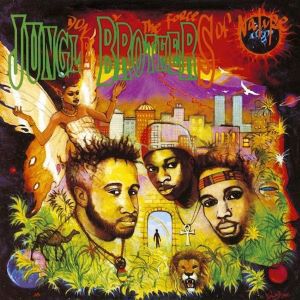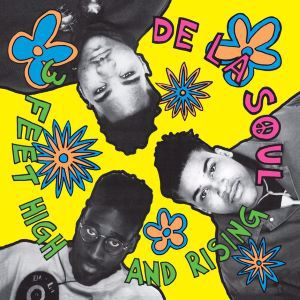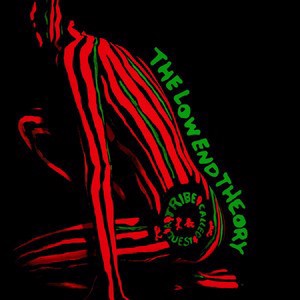The conscious grooves of Native Tongues hip-hop artists
One of my favorite eras in all of hip-hop are the groups that emerged in New York City and Long Island in the late 1980s. It was sometimes referred to as “socially conscious” or “Afrocentric” rap early on, or even “progressive rap” in hindsight. This time and place saw a group of young black MCs who didn’t feel represented by the anger of N.W.A. on the west coast, the militance of Public Enemy or the flashiness of Big Daddy Kane. So they forged their own sound and styles, frequently collaborating until the Native Tongues crew was born. Let’s check out its three main groups whose roots would grow a whole new branch of rap music.
Jungle Brothers (Digital)
 The first of the Native Tongues posse to release an album was the trio known as the Jungle Brothers in 1988. Made of Mike Gee, Sammy B and Afrika Baby Bam (a play on electro trailblazer Afrika Bambaataa), these three set the blueprint with tracks that sampled upbeat funk like James Brown and The Commodores.
The first of the Native Tongues posse to release an album was the trio known as the Jungle Brothers in 1988. Made of Mike Gee, Sammy B and Afrika Baby Bam (a play on electro trailblazer Afrika Bambaataa), these three set the blueprint with tracks that sampled upbeat funk like James Brown and The Commodores.
Their lyrics emphasized the African diaspora, positivity, and the power of intellect and humor, keeping things light as they traded verses. It wasn’t just audio but visually, too. Both their covers and their clothes reflected the black, red, yellow and green of their Afrocentric roots. They wore dashikis, kufis and ankh necklaces in contrast to Run-DMC’s Adidas style.
It’s a testament to their versatility their first big hit, I’ll House You, was bigger in NYC house clubs than in rap circles. While they continued to embrace dance, soul and funk on their second album Done by the Forces of Nature is a perfect rap album of its time. Produced by DJ Red Alert, one of NYC’s biggest radio tastemakers, their sound evolved into something much richer and more ambitious. It’s consistently high energy – a feel-good party record that doesn’t skimp on dense lyrics or messages. Its lasting single Doin’ Our Own Dang features De La Soul, Queen Latifah, Q-Tip and Monie Love making it one of Native Tongues’ greatest meeting-of-the-minds.
 While it took the J.B.’s a few years to hit their stride, De La Soul’s first album 3 Feet High and Rising in 1989 saw this trio emerge fully-formed. These guys fresh out of high school in Long Island came up with their own backwards nicknames of Trugoy the Dove, Posdnuos and Maseo (from last name Mason). Not stopping their, they had nicknames of Plug 1, 2 & 3 based on their microphone order, and a whole dictionary of slang they created pepper throughout 3 Feet High.
While it took the J.B.’s a few years to hit their stride, De La Soul’s first album 3 Feet High and Rising in 1989 saw this trio emerge fully-formed. These guys fresh out of high school in Long Island came up with their own backwards nicknames of Trugoy the Dove, Posdnuos and Maseo (from last name Mason). Not stopping their, they had nicknames of Plug 1, 2 & 3 based on their microphone order, and a whole dictionary of slang they created pepper throughout 3 Feet High.
The trio paired up with uber-creative producer Prince Paul who they went to Amityville High with. Shortly after, the group started exploring all the tools at their disposal at Calliope Studios where all these Native Tongues albums were recorded.
What emerged is a concept album of a game show, to help introduce you to the personality of these colorful cats. Not content with just that concept, it’s also transmitted live from Mars. In fact, this is the first rap album to introduce the skits or interludes between songs that was everywhere in the ‘90s.
The trio mix nursery rhymes, improv, beatboxing and clowning on your friends. It’s so chockful of samples from odd sources like Hall and Oates, Steely Dan and Parliament-Funkadelic that the label missed one. The Turtles sued them for $100k and for the last 10 years or so, most of De La’s discography has been unavailable in any form. In March 2023 all rights were finally cleared to re-release the album to re-appreciation from fans new and old. Sadly, Dave ‘Trugoy’ Jolicoeur died in February 2023 before he could see it happen.
A Tribe Called Quest (CD)
 Building (and having appeared) on the foundation of the two previous albums, the four members of A Tribe Called Quest were poised for greatness with their 1990 debut. People’s Instinctive Travels and the Paths of Rhythm is a tapestry of rich textures, characters and sound. The J.B.s and De La Sol excelled at fusing messages and wordplay with the varied genres that come from living in a metropolis like NYC. But Tribe’s strength was capturing its stories and vibes, and conveying it in a single song. They touch upon the emigrant experience (Luck of Lucien), vegetarianism (Ham ‘N’ Eggs), STDs (Pubic Enemy) and domestic violence (Description of a Fool).
Building (and having appeared) on the foundation of the two previous albums, the four members of A Tribe Called Quest were poised for greatness with their 1990 debut. People’s Instinctive Travels and the Paths of Rhythm is a tapestry of rich textures, characters and sound. The J.B.s and De La Sol excelled at fusing messages and wordplay with the varied genres that come from living in a metropolis like NYC. But Tribe’s strength was capturing its stories and vibes, and conveying it in a single song. They touch upon the emigrant experience (Luck of Lucien), vegetarianism (Ham ‘N’ Eggs), STDs (Pubic Enemy) and domestic violence (Description of a Fool).
The very next year ATCQ dropped The Low End Theory, which became one of defining albums not just of conscious rap or ‘90s hip-hop but the entire genre. The vocal trade-off between frontmen Q-Tip and Phife Dawg got tighter and wittier. And true to its name, the album focuses more on the rhythm section. In a stroke of genius, the band tapped legendary jazz bassist Ron Carter to provide upright bass for many songs. The Native Tongues' use of jazz samples for rap songs was already unprecedented but relying less on samples pushed the music forward.
After Tribe split in 1998, a fantastic documentary was made about their legacy, and a Book of essays was written about their impact. Then they defied expectations again for a final reunion album in 2016 We Got It From Here... Thank You 4 Your Service. Unlike most late career efforts it sounded vital and fresh. Each song has something to say, sometimes political, sometimes about the genre they had such an impact on, and in a heartfelt moment of silence - nothing. This was in tribute to Phife who unfortunately died of complications of diabetes right before the album was released.
An Enduring Influence
The Native Tongues collective was created to forge a path forward in rap where these newcomers felt nobody else was headed. Besides these three groups, the collective also included Queen Latifah, Monie Love, and honorary members like Busta Rhymes and Mos Def. Eventually they shrugged off the hippy, peace and flower iconography marketers kept forcing on them. But they never lost their sense of purpose and pride. Their conscious impact in hip-hop would be carried on by Common, Kendrick Lamar and J. Cole. No matter your age, gender, race or creed, these records have been a beacon of positivity and creativity in hip-hop ever since.















